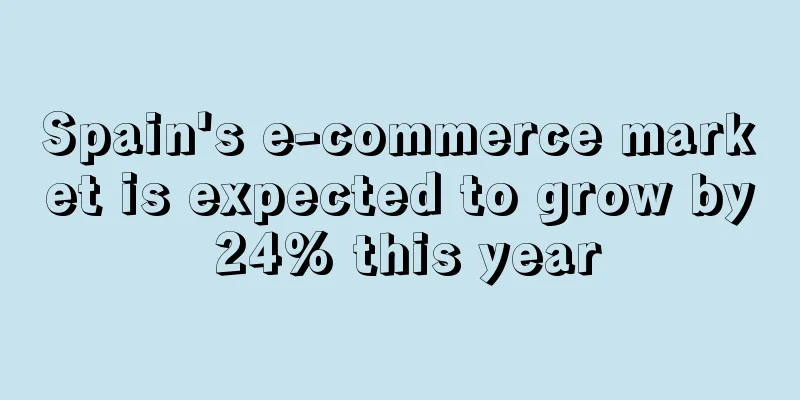Spain's e-commerce market is expected to grow by 24% this year

|
On July 20, according to foreign media reports, the growth rate of the Spanish e-commerce market has slowed down compared with 2020, but the growth rate is still expected to reach 24% this year, and the average e-commerce expenditure will be between 40,000 and 45 million euros.
The survey shows that as the COVID-19 pandemic has eased, the growth rate of Spain's e-commerce market has slowed down, but it is expected that at least 80% of Spaniards will still participate in online shopping this year .
Currently, the population of Spain is about 25.8 million, with an online shopping penetration rate of 76%. They shop online an average of 3.8 times a month, compared with 3.5 times a month in 2020 and 3 times a month in 2019.
In addition to the increase in the frequency of online shopping, the average online shopping expenditure in Spain has also increased. According to statistics, the average online shopping expenditure of Spaniards is currently 68 euros (68 euros in 2020 and 64 euros in 2019). Among them, technology/communication (60%), entertainment and culture (59%), food (56%) and fashion products (56%) are the most sold product categories in Spanish e-commerce this year.
It is worth noting that online shopping is more popular among young people. Among all age groups, Spanish young people under the age of 34 make the most online purchases, with a penetration rate of 83%.
However, young people in Spain do not simply shop online. Many of them also choose to shop in a combination of offline and online methods, and the proportion of people who choose this consumption method is further increasing.
In addition, the survey shows that in the post-epidemic era, there is a gradual trend of using virtual assistants for shopping in Spain. Compared with 2020, the number of transactions using virtual assistants in Spain is increasing significantly, up 6 percentage points from the previous year.
Among them, 37% of users have experience using virtual assistants, and 22% said they have completed shopping with the help of virtual assistants.
At present, Spanish e-commerce is in a stage of vigorous development, but some problems are inevitable, such as the incomplete supervision of online stores, which leads to the leakage of customer information and causes harm to consumers. In response, Spain plans to promulgate a series of e-commerce laws to regulate the market.
Spain E-commerce Online shopping |
<<: Attention! Typhoon landed, Yantian and Shekou ports stopped container delivery services
Recommend
SHEIN plans to hold a charity music festival on May 2 and live broadcast it through the App
Recently, SHEIN announced that it will hold its s...
What is Kerry Logistics (formerly Yanzhao Logistics)? Kerry Logistics (formerly Yanzhao Logistics) Review, Features
Henan Kairui Logistics Co., Ltd. (formerly Yanzha...
What is Shenzhen Yingtengbang Business Consulting Co., Ltd.? Shenzhen Yingtengbang Business Consulting Co., Ltd. Review, Features
Shenzhen Yingtengbang Business Consulting Co., Lt...
A Jiangxi boss switched from domestic trade to foreign trade in just one year and exported raincoats to Alibaba International Station with annual sales of nearly 10 million
"My biggest achievement at Alibaba Internati...
What is AFirst Logistics? AFirst Logistics Review, Features
Meilida Overseas Warehouse Logistics Co., Ltd. was...
What is Icubic Overseas Warehouse? Icubic Overseas Warehouse Review, Features
Icubic was founded in Melbourne, Australia in 2016...
What is DAJIAHEZUO? DAJIAHEZUO Review, Features
<span data-docs-delta="[[20,{"gallery"...
Amazon upgrades its “refund only” policy, and sellers are furious!
As one of the giants in the global e-commerce mar...
Amazon Israel offers free home delivery for orders over $65
According to foreign media reports, global shoppi...
What is shopify university? shopify universityReview, Features
Shopify University is the only official online lea...
Best Buy's first-quarter profit fell 43%, but its stock price rose against the trend!
On May 24, Best Buy released its financial report...
What is GoPayment? GoPayment Review, Features
<span data-docs-delta="[[20,{"gallery"...
Online sales in Spain increased 65% in the first quarter of this year
According to foreign media reports, Salesforce co...
The most profitable cross-border seller, with a net profit of 2.5 billion this year
As the internal competition intensifies, the prof...
Social commerce competition heats up with new features from Instagram, Pinterest and TikTok
On Monday, an Instagram representative said the p...









